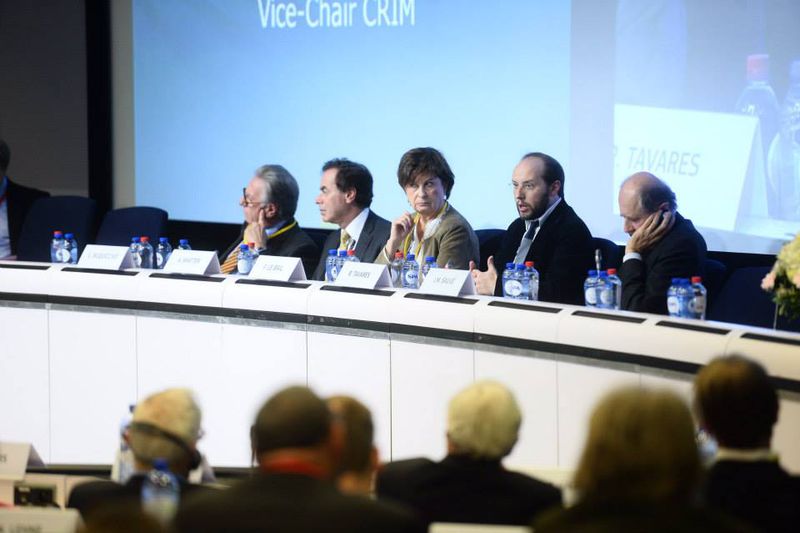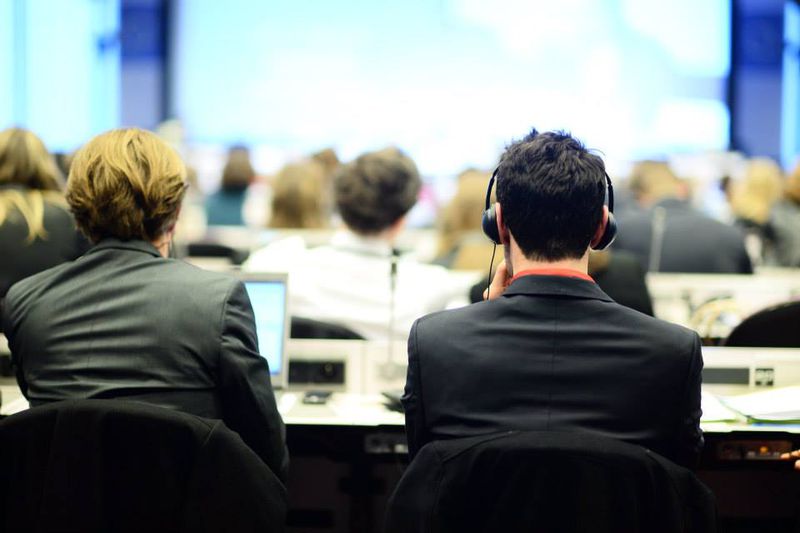The Rule of Law Mechanism Is Doomed To Impotence
Adelina Marini, November 26, 2013
 "But the most dramatic examples are in Eastern Europe. In Hungary, Romania and Bulgaria particularly, extreme right-wing militias have been terrorising Roma minorities and the homosexual community, faced only with general indifference from their respective governments". This is part of the analysis of the current situation with the rule of law and fundamental rights in the EU by the European Humanistic Federation. The analysis is the federation's contribution to the public debate on several documents of the European Commission that affect justice, fundamental rights, rule of law and, at large, the European values as they are described in Article 2 of the Treaty of the EU (TEU), which stipulates: "The Union is founded on the values of respect for human dignity, freedom, democracy, equality, the rule of law and respect for human rights, including the rights of persons belonging to minorities. These values are common to the Member States in a society in which pluralism, non-discrimination, tolerance, justice, solidarity and equality between women and men prevail".
"But the most dramatic examples are in Eastern Europe. In Hungary, Romania and Bulgaria particularly, extreme right-wing militias have been terrorising Roma minorities and the homosexual community, faced only with general indifference from their respective governments". This is part of the analysis of the current situation with the rule of law and fundamental rights in the EU by the European Humanistic Federation. The analysis is the federation's contribution to the public debate on several documents of the European Commission that affect justice, fundamental rights, rule of law and, at large, the European values as they are described in Article 2 of the Treaty of the EU (TEU), which stipulates: "The Union is founded on the values of respect for human dignity, freedom, democracy, equality, the rule of law and respect for human rights, including the rights of persons belonging to minorities. These values are common to the Member States in a society in which pluralism, non-discrimination, tolerance, justice, solidarity and equality between women and men prevail".
The European Commission is collecting opinions by the end of the year on how should the European space of freedom and security look like and, as part of it, a possible mechanism for protection of the rule of law. All official positions of civil organisations, governments, professional associations are already published, which served as a basis for a two-day conference on these matters in Brussels on November 21-22. The opinion of the little known European Humanistic Federation, however, is a very good basis for discussions. Besides, it mentions for the first time Bulgaria, omitted before from the argumentation of the need of such a mechanism. According to the federation's contribution, the rising populism is at the core of all problems.
The political parties that create the big problems in Europe are listed. Those are the True Finns in Finland, the Flemish Interest (Vlaams Belang) in Belgium, Golden Dawn in Greece (already banned), Ataka (Attack) in Bulgaria, Freedom Party in Austria, the National Front in France, Jobbik in Hungary, the UKIP in Britain, the Northern League and the Five Star Movement in Italy. All of them won between 10% and 25% of the votes, which makes them legitimate political forces, the non-governmental organisation believes.
So far the EU's response to the rise and depth of the populistic ideas is rather limited, the analysis says, to some extent because of the restrictions of the existing EU mechanisms and also because of the lack of political will of the member states. In most cases the Brussels's reactions to populistic driftings come as calls for vigilance and modesty, like, for instance, in the case of the French attacks on Roma in 2010 and 2013 or Schengen in 2012. In Italy, after Beppe Grillo and his Five Star Movement's victory in February 2012, the European Commission chief "even reaffirmed his 'confidence' in the political stability of the country when everyone was expressing strong concerns about Italy", the European Humanistic Federation points out. When we talk about rule of law in Italy, however, the Berlusconi factor should also be taken into account.
There was a much stronger reaction to Hungary, though. As the study says, unlike Austria (which was the first to trigger the Article 7 of TEU), in the Hungarian case it is not simply about the participation of a far right party in government, but about an authoritarian drift of the government which abuses its majority to restrict the democratic checks and balances. The Greek case is also very delicate to solve at European level because the party was democratically elected, the study recalls. The existing mechanisms allow the European citizens to turn to national courts and possibly to the European Court of Justice, but it is very likely the truly illiberal governments not to be impressed by their rulings. The same goes for the infringement procedures of the European Commission, the federation believes.
That is why it calls for deep analyses of the causes for populism in Europe, to assess the existing EU actions and to build a comprehensive strategy to fight populism. And also to create a new mechanism, analogical to that of the Council of Europe's Venice Commission, that will monitor the respect of the rule of law and fundamental rights by all member states. The non-governmental organisation entirely defends a simplification of the use of Article 7 of the TEU that envisages suspension of the rights in the Council of a member state, the so called "nuclear option". Moreover, the federation proposes this article to be extended to allow expulsion of a EU member state that dismantles its own democratic institutions.
Let us not forget the media
 With a contribution to the debates is also the Open Society European Policy Institute, recalling the main pillars of democracy. One of them is the freedom of expression which requires media pluralism. Some governments actively reduce media pluralism by systemically buying advertisement in government-friendly media, is written in the organisation's opinion. Something the European Commission noticed in the countries from the enlargement process. The implications, according to Open Society, are that pro-government businesses follow suit. This distorts the free competition of the media market because media that are systemically ignored find it difficult to survive. Moreover, such a discriminatory buying of advertisement is practically state aid, which is an illegal subsidy according to the competition rules of the single market.
With a contribution to the debates is also the Open Society European Policy Institute, recalling the main pillars of democracy. One of them is the freedom of expression which requires media pluralism. Some governments actively reduce media pluralism by systemically buying advertisement in government-friendly media, is written in the organisation's opinion. Something the European Commission noticed in the countries from the enlargement process. The implications, according to Open Society, are that pro-government businesses follow suit. This distorts the free competition of the media market because media that are systemically ignored find it difficult to survive. Moreover, such a discriminatory buying of advertisement is practically state aid, which is an illegal subsidy according to the competition rules of the single market.
Democracy, Open Society recalls, is also based on the principle politicians to reflect the visions of the people they govern. It is not rare, though, governments wanting to consolidate their power grip to develop narrow connections with powerful businesses that, for their part, influence voters, for example through financial support for client parties during election campaigns. The links between businesses and government are often created when national authorities discriminate to the advantage of their business allies when they seal lucrative public contracts.
The solution of this problem requires such a mechanism that needs Treaty change. However, the last time this took more than eight years. And hardly the EU will be capable to initiate such a change because governments are divided in their visions about whether such a thing makes sense, given the public scepticism towards the EU and the different attitude of the member states to the Treaties, the Open Society's contribution reads. "Faced with systematic efforts by the Hungarian government to undermine the rule of law and human rights and the failure of member states to respect their obligation to investigate their complicity in acts of torture and enforced disappearances in the context of the CIA rendition programme the Council has been silent. These examples show that when it comes to serious threats to the values of the European Union, the Council lacks the political will to act", concluded in its contribution the Amnesty International.
This is perfectly visible from the positions of only three member states who officially tabled their positions by November 20th. Those are Germany and a joint Irish-Finnish position. Berlin admits that there are problems with the implementation of the values in Article 2 of TEU, but points out that the Council should control the process - in other words to supervise itself. Germany completely rejects the possibility of treaty changes to create a more powerful mechanism. This position contradicts the position of the civil sector. In the same vein is also the Irish-Finnish opinion, although not as categorically expressed. Dublin and Helsinki call only for dialogue. The difference with Germany is that they recognise the Commission as a body that should have a leading role. Regular dialogues should be held between the Commission and the violating country and also annual discussions in the Council based on regular assessments. But in these assessments the quality of data is very important. Sanctions are not a good solution, the two nations believe.
The European Commission will probably present its communication on the rule of law mechanism in the beginning of next year, but taking into account that the European elections will take place in May 2014 and in the autumn next year the new Commission is to be nominated, we can hardly expect any development on this issue for at least a year. At the same time everyone are unanimous that at the spring European elections the big race is expected to be between radical populists and European  traditionalists. Neither of them will bring any good to the resepct of rule of law because this is not the main topic in the campaign.
traditionalists. Neither of them will bring any good to the resepct of rule of law because this is not the main topic in the campaign.
That is why it will continue to erode, especially in the new member states because they will remain unpunished. In this sense the question the Centre for European Policy Studies (CEPS) is very relevant. "If legal principles such as democracy, rule of law and fundamental rights are so important as to be listed in Article 2 of the Treaty on European Union, how is it possible that no EU monitoring tool exists to safeguard their observance?"
 Entrance to the Berlaymont building | © EC - Audiovisual Service
Entrance to the Berlaymont building | © EC - Audiovisual Service | © European Union 2020, EC - Audiovisual Service
| © European Union 2020, EC - Audiovisual Service Commission President Ursula von der Leyen | © European Union 2019 - Source: EP
Commission President Ursula von der Leyen | © European Union 2019 - Source: EP